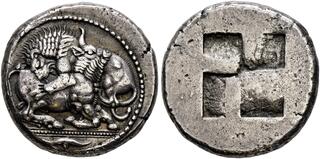| SINCONA AG > Auction 89 | Auction date: 13 May 2024 |
| Lot number: 510 Price realized: This lot is for sale in an upcoming auction - Bid on this lot  | Show similar lots on CoinArchives Find similar lots in upcoming auctions on |
| Lot description: THE GARRULUS COLLECTION. MACEDONIA. Akanthos. Tetradrachm c. 500 BC. (17.02 g, 1 h) Lion to left, attacking bull kneeling to right, head lifted; in exergue, flower. Rv. Quadripartite incuse square. Desneux 3. SNG Delepierre 864. Fast vorzüglich / About extremely fine. (~€ 2'605/USD 2'840) According to the ancient historian Nikolaos of Damaskos, Akanthos was presumably founded by colonists from the island of Andros in 655 BC. The first reliable evidence of the existence of an autonomous polis are the tetradrachms minted from 520 BC. These silver coins were not only used on the Chalcidian peninsula, but also in Sicily, Egypt and Persia. The export of silver in the form of these coins was an important source of income for Akanthos in archaic times, alongside the dominant agriculture. During the Persian Wars, Akanthos served the Persian general Mardonios in 492 BC and the Persian king Xerxes I in 480 BC as a base for their military operations in the Aegean region. After the defeat of the Persian Empire in 480/79 BC against the alliance of free Greek cities, Akanthos joined the Attic League under the leadership of Athens. Even after the outbreak of the Peloponnesian War between the Greek hegemonic powers Athens and Sparta, the city remained in the Attic League, although most of the poleis of the Chalcidian peninsula fell away from Athens. It was only when the city was threatened by the troops of the Spartan commander Brasidas in 424 BC that Akanthos changed sides. The Nicias Peace of 421 BC between Athens and Sparta provided for the autonomy of the polis, but Acanthus was obliged to pay tribute to Athens. Acanthos probably only gained complete autonomy after 405 BC with the defeat of Athens at Aigospotamoi in the renewed war against Sparta. In the following decades, its autonomy remained untouched. It finally lost its freedom with the expansion of Macedonia under King Philip II. In the middle of the 4th century BC. News about Akanthos only dates back to 199 BC. In this year, the city was plundered by Roman troops during the Second Macedonian War, but continued to exist until the Roman imperial period. From auction Leu 77, Zurich, May 2000, lot 152. • Dieses Los unterliegt bei Auslieferung in der Schweiz der Margenbesteuerung gemäss MWSTG 24a (23% Aufgeld inkl. gesetzlicher Mehrwertsteuer) • When delivered in Switzerland, this lot is subject to the margin taxation scheme in accordance with article 24a of the Federal Act on Value Added Tax (23% buyer's premium incl. statutory VAT). Starting price: 2500 CHF |  |



